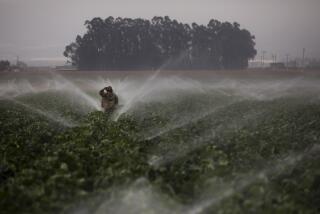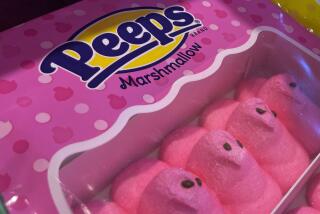Apple-Scare Chemical Alar Being Taken Off Market
- Share via
WASHINGTON — In a surprise climax to months of concern about tainted apples, the Uniroyal Chemical Co. on Friday agreed to halt sales of the controversial chemical Alar across the United States.
The move, to be enforced by the Environmental Protection Agency, is expected to discourage Alar use by American growers who still favor the chemical, which enhances apples’ growth and gives them longer shelf life but which has been linked to cancer.
The decision was announced as the Senate was about to consider an even more sweeping proposal that would ban daminozide, which is marketed under the name Alar, outright and bar the importation of foreign apple products treated with Alar.
Uniroyal, the chemical’s only manufacturer, said in a statement that it had taken the action to “help lower the emotional level, reassure people about food safety and let objective science prevail.”
The company maintained that Alar is safe and indicated that it hopes eventually to resume sales of the product. The EPA has proposed banning Alar within the next 18 months, but the action will not become final until a scientific review is completed.
In the meantime, Uniroyal said it plans to continue to market Alar to apple growers overseas. That caused alarm among environmentalists, who noted that as much as 50% of the apple juice concentrate sold in the United States is produced from apples grown in Europe and South America.
“This agreement does not go as far as it should, and the public health is not going to be as well served,” said Janet Hathaway, an attorney for the Natural Resources Defense Council.
It was that organization’s report four months ago about the risk posed by Alar that prompted a surge of public anxiety about the safety of food in the American marketplace. At the height of the episode, the nation’s largest school districts banned apples from lunch menus and frantic parents sought reassurance from federal agencies about the fruit they fed their children.
Many growers and grocers began labeling their products as Alar-free, and they urged Uniroyal to withdraw the chemical from the market so that consumers need have no lingering fears.
‘Let the Fear Stop’
The chemical company sought Friday to present its decision as a voluntary effort to “let the fear stop here.” However, its critics contended that Uniroyal’s hand had been forced by the public outcry.
“This is the furthest thing from altruism,” Hathaway said. “What they’re trying to do is to save their own skin.”
Uniroyal has directed its sales offices to accept no new orders for Alar, and it will offer to buy back all stocks of the chemical held by distributors and growers.
The voluntary action is to be monitored by the EPA, which had refused to ban Alar outright, saying the agency had uncovered no evidence to justify emergency action. The agency had said, however, that evidence about the carcinogenic effects of Alar in some tests was cause for concern.
In announcing its plans to monitor the removal of Alar from the market, the EPA indicated that it would also notify foreign governments of the status of the chemical in the United States.
But a principal sponsor of the Senate anti-Alar amendment, Sen. Joseph I. Lieberman (D-Conn.), said in an interview that he remains “troubled” by the prospect that imported apple products might still contain Alar.
Lieberman said he and other senators will decide next week whether to introduce new legislation aimed at reducing the government’s tolerance for Alar to zero, thereby blocking importation of any fruit treated with the chemical.
A Uniroyal executive, James A. Wylie, said the company had been negotiating with the EPA since early May on the Alar issue. An EPA official indicated that resolution of an impasse in the negotiations had been reached suddenly when it appeared that the Senate might approve an amendment banning Alar. That measure is now expected to be withdrawn.
Estimates of the part of the U.S. apple crop sprayed with Alar last year range from 15% to more than 40%. Industry analysts have said that they think few if any growers would use Alar this year even if the product were available.
Apple growers applauded the decision by Uniroyal, but some suggested that the company should have made the move much earlier. The International Apple Institute estimates that growers have lost more than $100 million because of the apple scare over Alar in recent months.
Firm Acted ‘Darn Late’
“They are darn late in getting to this point. We’ve been after them for a long time, and consumer confidence has been affected,” said John McAlister of Tree Top Inc., the nation’s largest apple juice maker.
McAlister told the Associated Press in Yakima, Wash., that Tree Top’s sales have dropped more than 20% since the Alar controversy began, even though Tree Top and other processors have said repeatedly that they do not use Alar-treated apples.
“This action is most welcomed . . . since it will allay any remaining concerns consumers may have about small levels of Alar in apples and apple products,” said Larry Davenport, executive director of the Processed Apples Institute.
More to Read
Inside the business of entertainment
The Wide Shot brings you news, analysis and insights on everything from streaming wars to production — and what it all means for the future.
You may occasionally receive promotional content from the Los Angeles Times.










